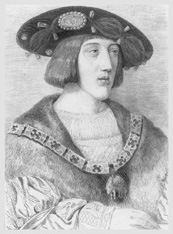The Good, the Bad and the Unready (33 page)
Read The Good, the Bad and the Unready Online
Authors: Robert Easton

Harthacanute was the legitimate heir to the thrones of both Denmark and England. Harold agreed to act as his regent in England but quickly reneged on his promise and proclaimed himself king. Three months after Harold’s death Harthacanute arrived in England to claim the throne. Unable to take revenge on Harold when he was still alive, Harthacanute arranged for Harold’s body to be exhumed, torn apart and flung into a bog.
 Charles the
Charles the
Harlequin
Charles V, Holy Roman Emperor, 1500–1558

Charles the
Harlequin
While Charles V was certainly a fearless and indefatigable warrior, one of his epithets, ‘a Second Charlemagne’, would appear to be based solely on the two monarchs’ sharing the same Christian name. Whereas Charles the
GREAT
was a devout man of faith, Charles V spent his retirement at Yuste Monastery in Estremadura en-
gaged in feasting rather than fasting. And whereas the real Charlemagne drank in moderation, this ‘Charlemagne’, according to one English traveller, drank ‘the best that ever I saw… his head in the glass five times as long as any of us, and never [drinking] less than a quart at once of Rhenish wine’.
A second soubriquet, ‘a Discrowned Glutton’, is more apt. After a reign enmeshed in civil strife and foreign upheaval, Charles, who was already decidedly chubby, waddled away from it all and abdicated for a life of culinary overindulgence.
A third nickname, ‘the Harlequin’, initially seems to be the most inappropriate of all. How could fellow nicknamee Francis the
FATHER OF LETTERS
liken Charles to a frivolous buffoon when in reality the emperor was a serious, phlegmatic character who rarely spoke since his misshapen jaw made him difficult to understand and, when he did, it was in German and mainly to his horse? The answer is that Francis was using the term ‘harlequin’ in its Old French sense, meaning ‘demon’.
 Amadeus the
Amadeus the
Hermit of La Ripaille
see
Amadeus the
PACIFIC
 Frederick the
Frederick the
Hesitater
see
Frederick the
WISE
 Charles the
Charles the
Highland Laddie
see
BONNIE PRINCE CHARLIE
 Holy Mother
Holy Mother
see
Lady Wu the
POISONER
 Hywel of the
Hywel of the
Horseshoes
Sir Hywel ap Gruffyth, Welsh nobleman, b.c.1284
Hywel was the son of the wet nurse of Edward
CARNARVON
. Edward was so impressed with his foster brother and boyhood chum – not least with his ability to break or straighten horseshoes with his bare hands – that he made him a knight of the realm.
 Harry
Harry
Hotspur
Henry Percy, English nobleman, 1364–1403
Henry Percy, the eldest son of the first earl of Northumberland, earned his evocative nickname for the reckless courage he showed in battles along the Scottish Borders, including the 1402 victory over the Scots at Homildon Hill, a fight which was lost by Archibald the
LOSER
. In what turned out to be a rash and impetuous move, Henry conspired with Owen Glendower and others to dethrone Henry
BOLINGBROKE
, and was killed by the king’s troops at the battle of Shrewsbury in 1403.
 Pepin the
Pepin the
Hunchback
Pepin, Frankish prince, d.811
Despite his deformity, Pepin was initially designated as the future ruler by his father Charles the
GREAT
, but this was reversed when, thanks to Charles’s second wife, the young and fertile Hildegard, another son appeared. Pepin was not pleased with this arrangement and, together with some disgruntled magnates, entered into a conspiracy to seize the throne while Charlemagne was away at war. The plot, however, was discovered and Pepin, according to the biographer Einhard, was ‘cruelly scourged, tonsured and sent into a monastery, the poorest… in all the king’s broad domain’.
A near-contemporary writer known as ‘Notker the Stammerer’ tells how Charlemagne later discovered another plot against his life and sought advice from his reluctantly monastic son. Pepin, weeding in the garden, apparently told his father’s
envoys to report back precisely what he was doing, namely digging up useless weeds to enable other plants to prosper. Charles understood his son’s cryptic message and promptly got rid of his enemies by having them executed. He then rewarded Pepin by letting him move to ‘the most noble monastery then in existence’.
In all likelihood, however, Notker’s story is a complete fabrication and Pepin actually died unreconciled and in abject poverty.
 James the
James the
Ill-beloved